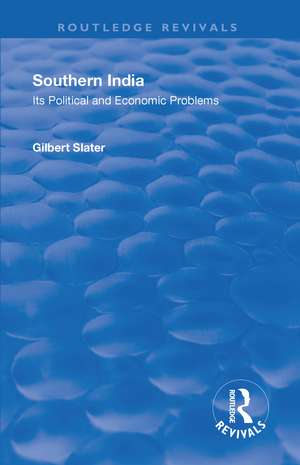Revival: Southern India (1936): Its Political and Economic Problems: Routledge Revivals
Autor Gilbert Slateren Limba Engleză Paperback – 29 ian 2019
| Toate formatele și edițiile | Preț | Express |
|---|---|---|
| Paperback (1) | 461.03 lei 6-8 săpt. | |
| Taylor & Francis – 29 ian 2019 | 461.03 lei 6-8 săpt. | |
| Hardback (1) | 1555.75 lei 6-8 săpt. | |
| Taylor & Francis – 3 ian 2018 | 1555.75 lei 6-8 săpt. |
Din seria Routledge Revivals
- 9%
 Preț: 767.40 lei
Preț: 767.40 lei - 9%
 Preț: 1004.17 lei
Preț: 1004.17 lei - 9%
 Preț: 934.94 lei
Preț: 934.94 lei -
 Preț: 230.80 lei
Preț: 230.80 lei -
 Preț: 294.72 lei
Preț: 294.72 lei -
 Preț: 258.66 lei
Preț: 258.66 lei - 9%
 Preț: 903.41 lei
Preț: 903.41 lei - 18%
 Preț: 695.85 lei
Preț: 695.85 lei -
 Preț: 296.10 lei
Preț: 296.10 lei -
 Preț: 342.36 lei
Preț: 342.36 lei - 9%
 Preț: 606.35 lei
Preț: 606.35 lei -
 Preț: 309.94 lei
Preț: 309.94 lei - 9%
 Preț: 729.99 lei
Preț: 729.99 lei -
 Preț: 256.94 lei
Preț: 256.94 lei -
 Preț: 230.80 lei
Preț: 230.80 lei -
 Preț: 259.47 lei
Preț: 259.47 lei - 9%
 Preț: 903.80 lei
Preț: 903.80 lei -
 Preț: 153.81 lei
Preț: 153.81 lei -
 Preț: 258.66 lei
Preț: 258.66 lei -
 Preț: 294.91 lei
Preț: 294.91 lei -
 Preț: 200.66 lei
Preț: 200.66 lei -
 Preț: 199.85 lei
Preț: 199.85 lei -
 Preț: 308.89 lei
Preț: 308.89 lei -
 Preț: 295.04 lei
Preț: 295.04 lei -
 Preț: 382.23 lei
Preț: 382.23 lei -
 Preț: 258.66 lei
Preț: 258.66 lei -
 Preț: 343.21 lei
Preț: 343.21 lei - 9%
 Preț: 640.90 lei
Preț: 640.90 lei - 9%
 Preț: 605.71 lei
Preț: 605.71 lei -
 Preț: 228.88 lei
Preț: 228.88 lei -
 Preț: 257.67 lei
Preț: 257.67 lei -
 Preț: 245.10 lei
Preț: 245.10 lei -
 Preț: 258.52 lei
Preț: 258.52 lei -
 Preț: 258.66 lei
Preț: 258.66 lei -
 Preț: 368.93 lei
Preț: 368.93 lei -
 Preț: 246.37 lei
Preț: 246.37 lei - 9%
 Preț: 764.34 lei
Preț: 764.34 lei -
 Preț: 258.66 lei
Preț: 258.66 lei -
 Preț: 326.26 lei
Preț: 326.26 lei -
 Preț: 286.98 lei
Preț: 286.98 lei - 8%
 Preț: 418.23 lei
Preț: 418.23 lei - 5%
 Preț: 231.22 lei
Preț: 231.22 lei -
 Preț: 267.15 lei
Preț: 267.15 lei -
 Preț: 295.62 lei
Preț: 295.62 lei - 9%
 Preț: 638.61 lei
Preț: 638.61 lei -
 Preț: 260.85 lei
Preț: 260.85 lei -
 Preț: 339.90 lei
Preț: 339.90 lei -
 Preț: 381.17 lei
Preț: 381.17 lei -
 Preț: 294.53 lei
Preț: 294.53 lei -
 Preț: 294.72 lei
Preț: 294.72 lei
Preț: 461.03 lei
Preț vechi: 542.39 lei
-15% Nou
Puncte Express: 692
Preț estimativ în valută:
88.23€ • 91.15$ • 73.43£
88.23€ • 91.15$ • 73.43£
Carte tipărită la comandă
Livrare economică 25 martie-08 aprilie
Preluare comenzi: 021 569.72.76
Specificații
ISBN-13: 9781138566194
ISBN-10: 1138566195
Pagini: 418
Dimensiuni: 138 x 216 x 22 mm
Greutate: 0.45 kg
Ediția:1
Editura: Taylor & Francis
Colecția Routledge
Seria Routledge Revivals
Locul publicării:Oxford, United Kingdom
ISBN-10: 1138566195
Pagini: 418
Dimensiuni: 138 x 216 x 22 mm
Greutate: 0.45 kg
Ediția:1
Editura: Taylor & Francis
Colecția Routledge
Seria Routledge Revivals
Locul publicării:Oxford, United Kingdom
Cuprins
I PROLOGUE II BOMBAY CITY AND THE BOMBAY DECCAN III FIRST DAYS IN MADRAS IV THE GEOGRAPHY OF MADRAS V MAKING CONTACTS VI ERUVELLIPET, A DELTA VILLAGE VII SALEM AND ITS ENVIRONS VII PALNI AND RESETTLEMENT IN MADURA DISTRICT IX THE CITY OF MADURA X THE TINNEVELLY COTTON AREA XI KUMBAKONAM XII THE NILGIRIS AND THE PALNI HILLS XIII THE COIMBATORE AGRICULTURAL COLLEGE XIV TRICHINOPOLY XV CUDDALORE AND PONDICHERRY XVI COCHIN AND TRICHUR XVII CO-OPERATION IN CONJIVERAM AND ELSE-WHERE XIX THE INDIAN ECONOMIC ASSOCIATION XX JUTE-MILLS AND THE MANAGING AGENT SYSTEM XXI THE TATA IRON AND STEEL COMPANY AND THE MADRA COTTON-MILLS XXII PEASANTS IN GANJAM AND THE GODAVARI DELTA XXIIIMYSORE STATE XXIV A VISIT TO BURMA XXV PUBLIC AFFAIRS IN MADRAS, 1912-22 XXVI THE FAMINES OF 1918 AND 1920 XXVII THE WAR AND AFTER XXVIII THE NEW CONSTITUTION IN MADRAS XXIX LABOUR TROUBLES XXX THE WORK OF THE MADRAS PUBLICITY XXXI THE MADRAS LEGISLATIVE COUNCIL, XXXII EPILOGUE Index of persons and places
Notă biografică
Gilbert Slater (27 August 1864 – 8 March 1938) was an English economist and social reformer of the early 20th century.
Gilbert was born in Plymouth in 1864. His father was a school teacher. Slater studied economics and worked as a professor. In 1909, he was appointed principal of Ruskin College and served from 1909 to 1915. From 1915 to 1921, Slater served as the Professor of Economics at the University of Madras. Slater died in 1938 at the age of 73.
Slater is known for rural developments he initiated in India. Slater is also known for his love for Dravidian culture and civilization and for theorizing that the works of Shakespeare were actually written by several different writers at different times.
Gilbert was born in Plymouth in 1864. His father was a school teacher. Slater studied economics and worked as a professor. In 1909, he was appointed principal of Ruskin College and served from 1909 to 1915. From 1915 to 1921, Slater served as the Professor of Economics at the University of Madras. Slater died in 1938 at the age of 73.
Slater is known for rural developments he initiated in India. Slater is also known for his love for Dravidian culture and civilization and for theorizing that the works of Shakespeare were actually written by several different writers at different times.
Descriere
This book deals firstly with the economic and social conditions of life among the villagers, the artisans, and other workers in cities and towns of South India, and also with the new issues raised in India during the most momentous years of its history since the mutiny.
